Analysis of Virtual vs. Face-to-Face Marketing Teams: MNG81001 Report
VerifiedAdded on 2023/01/19
|13
|1659
|27
Report
AI Summary
This report addresses the Marketing Director of ABC Company, who is deciding whether to implement virtual marketing teams across multiple international locations or to continue with a traditional face-to-face team based in Melbourne. The report argues in favor of maintaining the traditional approach. It highlights the benefits of face-to-face teams, such as enhanced coordination, increased task efficiency due to social ties, and simpler member selection processes. While acknowledging the potential cost savings of virtual teams, the report emphasizes the complexities of managing them and recommends sticking to the traditional model. The conclusion reinforces the advantages of greater managerial control and suggests redesigning the organizational structure before considering virtual team implementation. The report references several academic sources to support its arguments and recommendations.

Management Communication
NAME OF STUDENT
NAME OF COLLEGE
AUTHORS NOTE
Running head: MANAGEMENT COMMUNICATION
NAME OF STUDENT
NAME OF COLLEGE
AUTHORS NOTE
Running head: MANAGEMENT COMMUNICATION
Paraphrase This Document
Need a fresh take? Get an instant paraphrase of this document with our AI Paraphraser
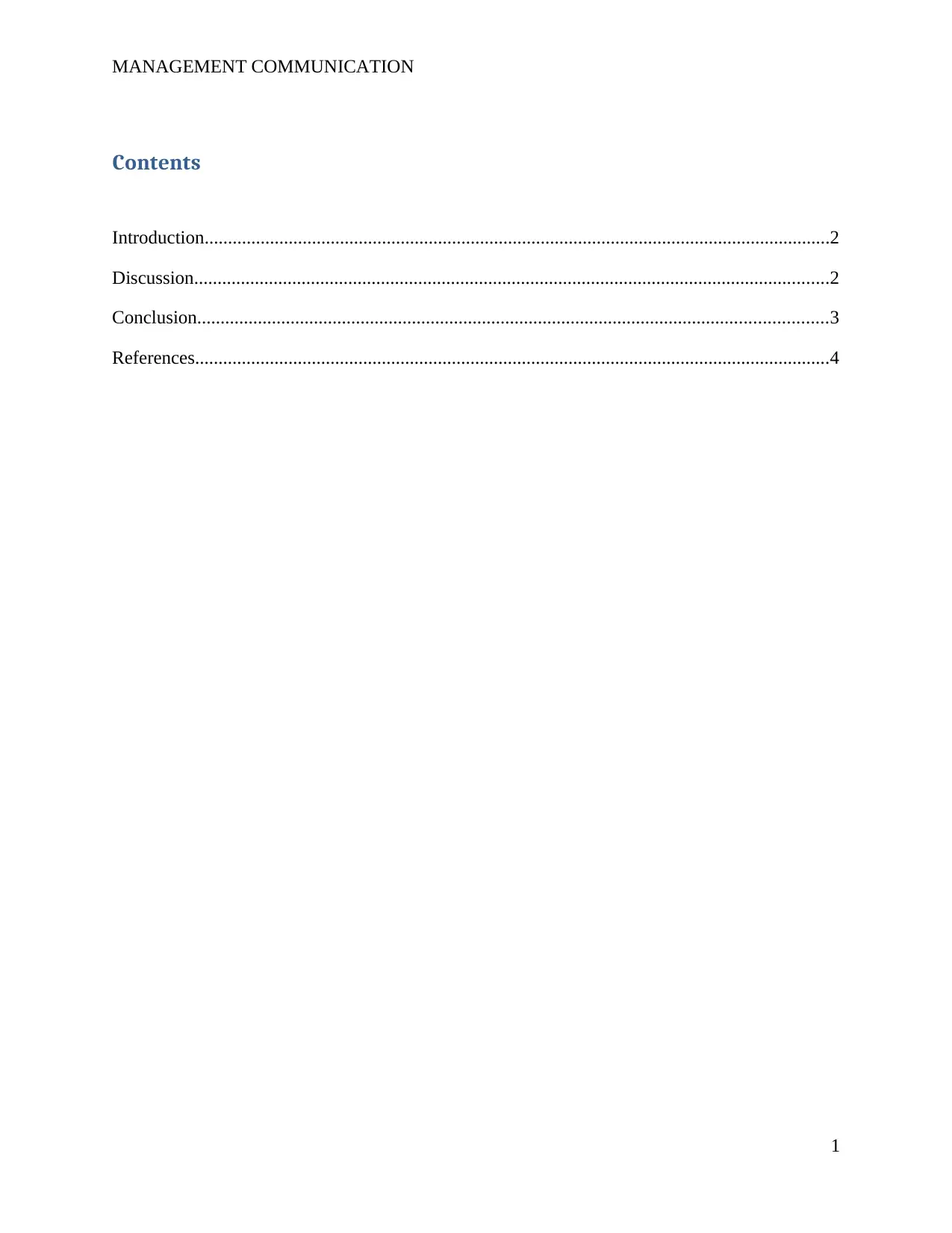
MANAGEMENT COMMUNICATION
Contents
Introduction......................................................................................................................................2
Discussion........................................................................................................................................2
Conclusion.......................................................................................................................................3
References........................................................................................................................................4
1
Contents
Introduction......................................................................................................................................2
Discussion........................................................................................................................................2
Conclusion.......................................................................................................................................3
References........................................................................................................................................4
1
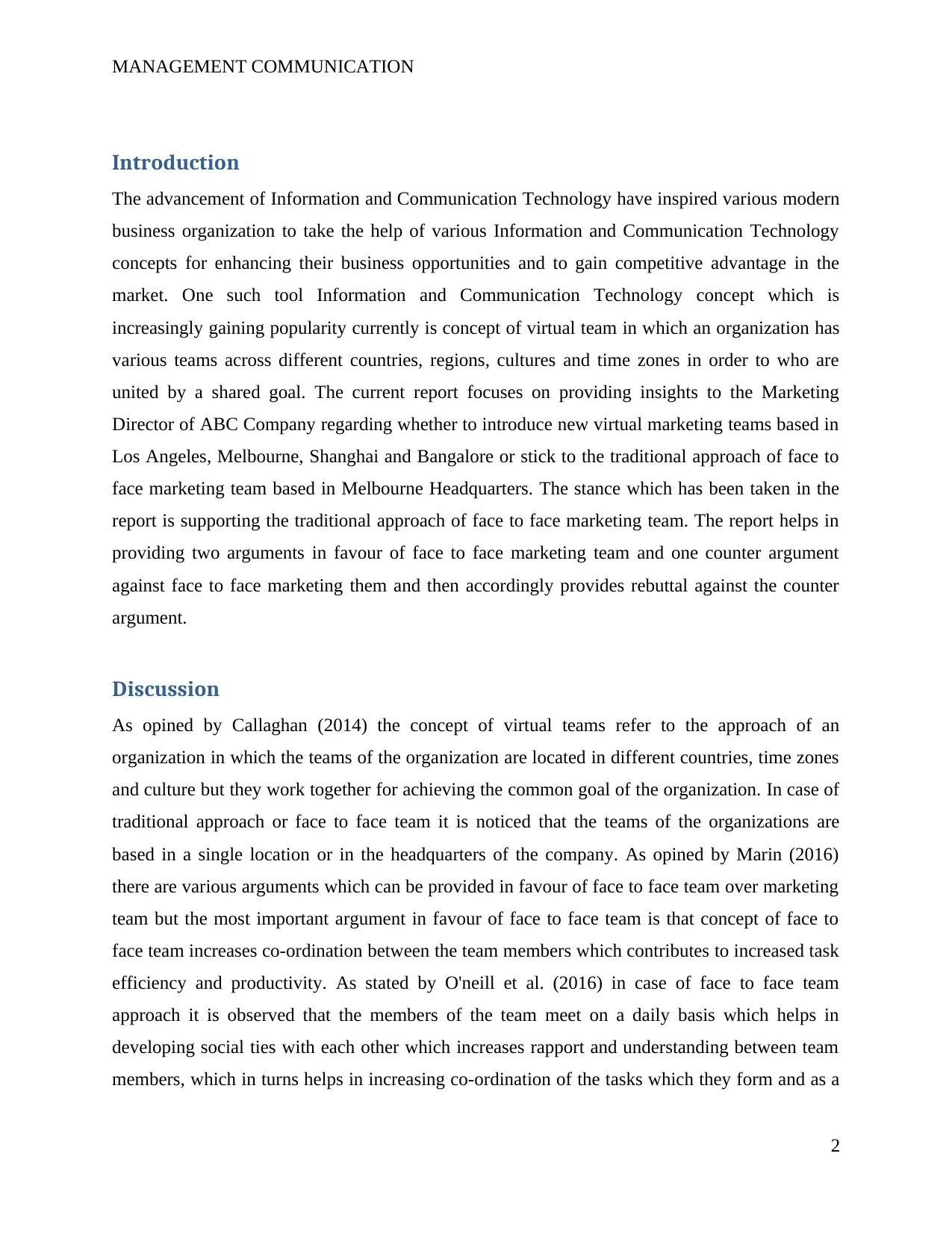
MANAGEMENT COMMUNICATION
Introduction
The advancement of Information and Communication Technology have inspired various modern
business organization to take the help of various Information and Communication Technology
concepts for enhancing their business opportunities and to gain competitive advantage in the
market. One such tool Information and Communication Technology concept which is
increasingly gaining popularity currently is concept of virtual team in which an organization has
various teams across different countries, regions, cultures and time zones in order to who are
united by a shared goal. The current report focuses on providing insights to the Marketing
Director of ABC Company regarding whether to introduce new virtual marketing teams based in
Los Angeles, Melbourne, Shanghai and Bangalore or stick to the traditional approach of face to
face marketing team based in Melbourne Headquarters. The stance which has been taken in the
report is supporting the traditional approach of face to face marketing team. The report helps in
providing two arguments in favour of face to face marketing team and one counter argument
against face to face marketing them and then accordingly provides rebuttal against the counter
argument.
Discussion
As opined by Callaghan (2014) the concept of virtual teams refer to the approach of an
organization in which the teams of the organization are located in different countries, time zones
and culture but they work together for achieving the common goal of the organization. In case of
traditional approach or face to face team it is noticed that the teams of the organizations are
based in a single location or in the headquarters of the company. As opined by Marin (2016)
there are various arguments which can be provided in favour of face to face team over marketing
team but the most important argument in favour of face to face team is that concept of face to
face team increases co-ordination between the team members which contributes to increased task
efficiency and productivity. As stated by O'neill et al. (2016) in case of face to face team
approach it is observed that the members of the team meet on a daily basis which helps in
developing social ties with each other which increases rapport and understanding between team
members, which in turns helps in increasing co-ordination of the tasks which they form and as a
2
Introduction
The advancement of Information and Communication Technology have inspired various modern
business organization to take the help of various Information and Communication Technology
concepts for enhancing their business opportunities and to gain competitive advantage in the
market. One such tool Information and Communication Technology concept which is
increasingly gaining popularity currently is concept of virtual team in which an organization has
various teams across different countries, regions, cultures and time zones in order to who are
united by a shared goal. The current report focuses on providing insights to the Marketing
Director of ABC Company regarding whether to introduce new virtual marketing teams based in
Los Angeles, Melbourne, Shanghai and Bangalore or stick to the traditional approach of face to
face marketing team based in Melbourne Headquarters. The stance which has been taken in the
report is supporting the traditional approach of face to face marketing team. The report helps in
providing two arguments in favour of face to face marketing team and one counter argument
against face to face marketing them and then accordingly provides rebuttal against the counter
argument.
Discussion
As opined by Callaghan (2014) the concept of virtual teams refer to the approach of an
organization in which the teams of the organization are located in different countries, time zones
and culture but they work together for achieving the common goal of the organization. In case of
traditional approach or face to face team it is noticed that the teams of the organizations are
based in a single location or in the headquarters of the company. As opined by Marin (2016)
there are various arguments which can be provided in favour of face to face team over marketing
team but the most important argument in favour of face to face team is that concept of face to
face team increases co-ordination between the team members which contributes to increased task
efficiency and productivity. As stated by O'neill et al. (2016) in case of face to face team
approach it is observed that the members of the team meet on a daily basis which helps in
developing social ties with each other which increases rapport and understanding between team
members, which in turns helps in increasing co-ordination of the tasks which they form and as a
2
⊘ This is a preview!⊘
Do you want full access?
Subscribe today to unlock all pages.

Trusted by 1+ million students worldwide
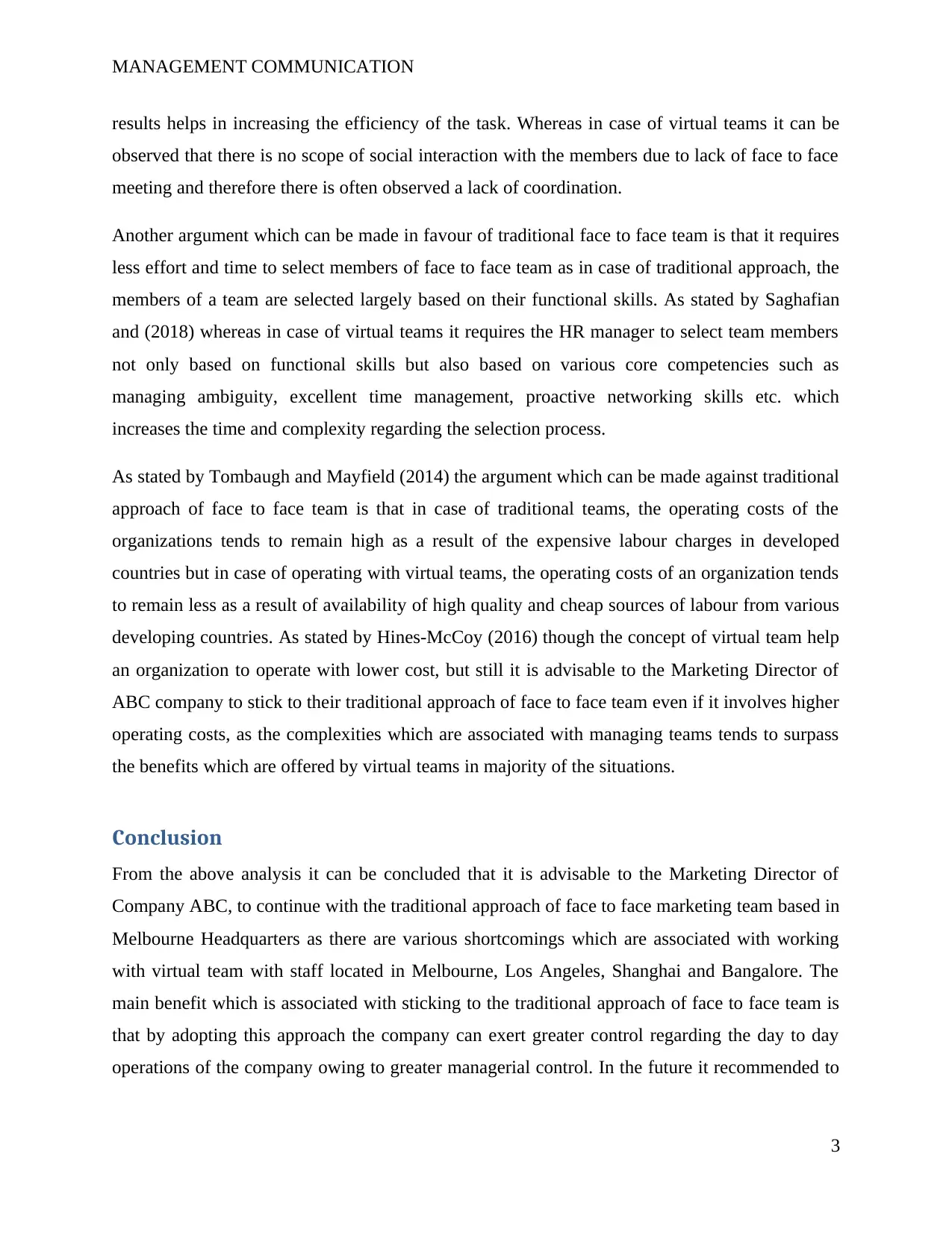
MANAGEMENT COMMUNICATION
results helps in increasing the efficiency of the task. Whereas in case of virtual teams it can be
observed that there is no scope of social interaction with the members due to lack of face to face
meeting and therefore there is often observed a lack of coordination.
Another argument which can be made in favour of traditional face to face team is that it requires
less effort and time to select members of face to face team as in case of traditional approach, the
members of a team are selected largely based on their functional skills. As stated by Saghafian
and (2018) whereas in case of virtual teams it requires the HR manager to select team members
not only based on functional skills but also based on various core competencies such as
managing ambiguity, excellent time management, proactive networking skills etc. which
increases the time and complexity regarding the selection process.
As stated by Tombaugh and Mayfield (2014) the argument which can be made against traditional
approach of face to face team is that in case of traditional teams, the operating costs of the
organizations tends to remain high as a result of the expensive labour charges in developed
countries but in case of operating with virtual teams, the operating costs of an organization tends
to remain less as a result of availability of high quality and cheap sources of labour from various
developing countries. As stated by Hines-McCoy (2016) though the concept of virtual team help
an organization to operate with lower cost, but still it is advisable to the Marketing Director of
ABC company to stick to their traditional approach of face to face team even if it involves higher
operating costs, as the complexities which are associated with managing teams tends to surpass
the benefits which are offered by virtual teams in majority of the situations.
Conclusion
From the above analysis it can be concluded that it is advisable to the Marketing Director of
Company ABC, to continue with the traditional approach of face to face marketing team based in
Melbourne Headquarters as there are various shortcomings which are associated with working
with virtual team with staff located in Melbourne, Los Angeles, Shanghai and Bangalore. The
main benefit which is associated with sticking to the traditional approach of face to face team is
that by adopting this approach the company can exert greater control regarding the day to day
operations of the company owing to greater managerial control. In the future it recommended to
3
results helps in increasing the efficiency of the task. Whereas in case of virtual teams it can be
observed that there is no scope of social interaction with the members due to lack of face to face
meeting and therefore there is often observed a lack of coordination.
Another argument which can be made in favour of traditional face to face team is that it requires
less effort and time to select members of face to face team as in case of traditional approach, the
members of a team are selected largely based on their functional skills. As stated by Saghafian
and (2018) whereas in case of virtual teams it requires the HR manager to select team members
not only based on functional skills but also based on various core competencies such as
managing ambiguity, excellent time management, proactive networking skills etc. which
increases the time and complexity regarding the selection process.
As stated by Tombaugh and Mayfield (2014) the argument which can be made against traditional
approach of face to face team is that in case of traditional teams, the operating costs of the
organizations tends to remain high as a result of the expensive labour charges in developed
countries but in case of operating with virtual teams, the operating costs of an organization tends
to remain less as a result of availability of high quality and cheap sources of labour from various
developing countries. As stated by Hines-McCoy (2016) though the concept of virtual team help
an organization to operate with lower cost, but still it is advisable to the Marketing Director of
ABC company to stick to their traditional approach of face to face team even if it involves higher
operating costs, as the complexities which are associated with managing teams tends to surpass
the benefits which are offered by virtual teams in majority of the situations.
Conclusion
From the above analysis it can be concluded that it is advisable to the Marketing Director of
Company ABC, to continue with the traditional approach of face to face marketing team based in
Melbourne Headquarters as there are various shortcomings which are associated with working
with virtual team with staff located in Melbourne, Los Angeles, Shanghai and Bangalore. The
main benefit which is associated with sticking to the traditional approach of face to face team is
that by adopting this approach the company can exert greater control regarding the day to day
operations of the company owing to greater managerial control. In the future it recommended to
3
Paraphrase This Document
Need a fresh take? Get an instant paraphrase of this document with our AI Paraphraser
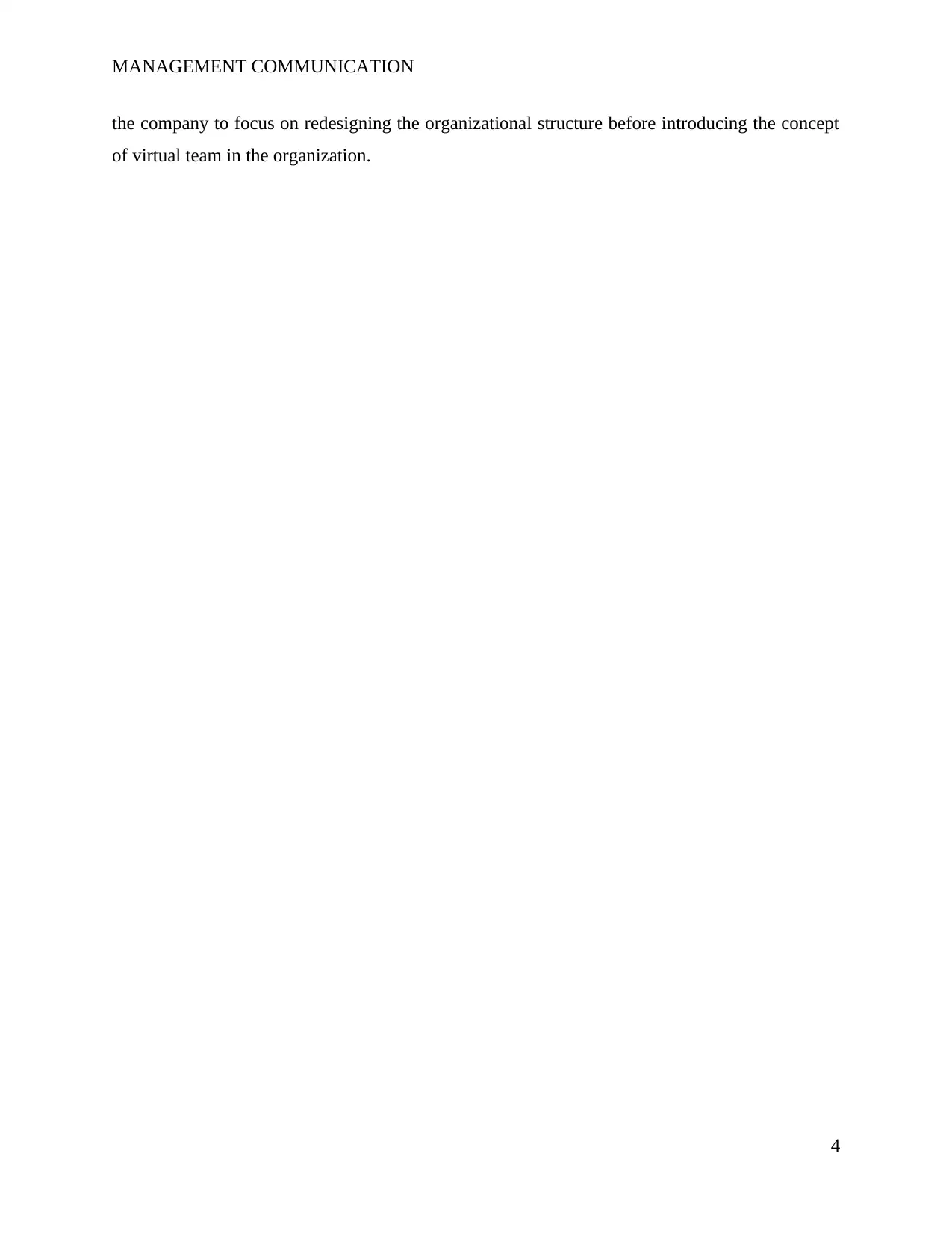
MANAGEMENT COMMUNICATION
the company to focus on redesigning the organizational structure before introducing the concept
of virtual team in the organization.
4
the company to focus on redesigning the organizational structure before introducing the concept
of virtual team in the organization.
4
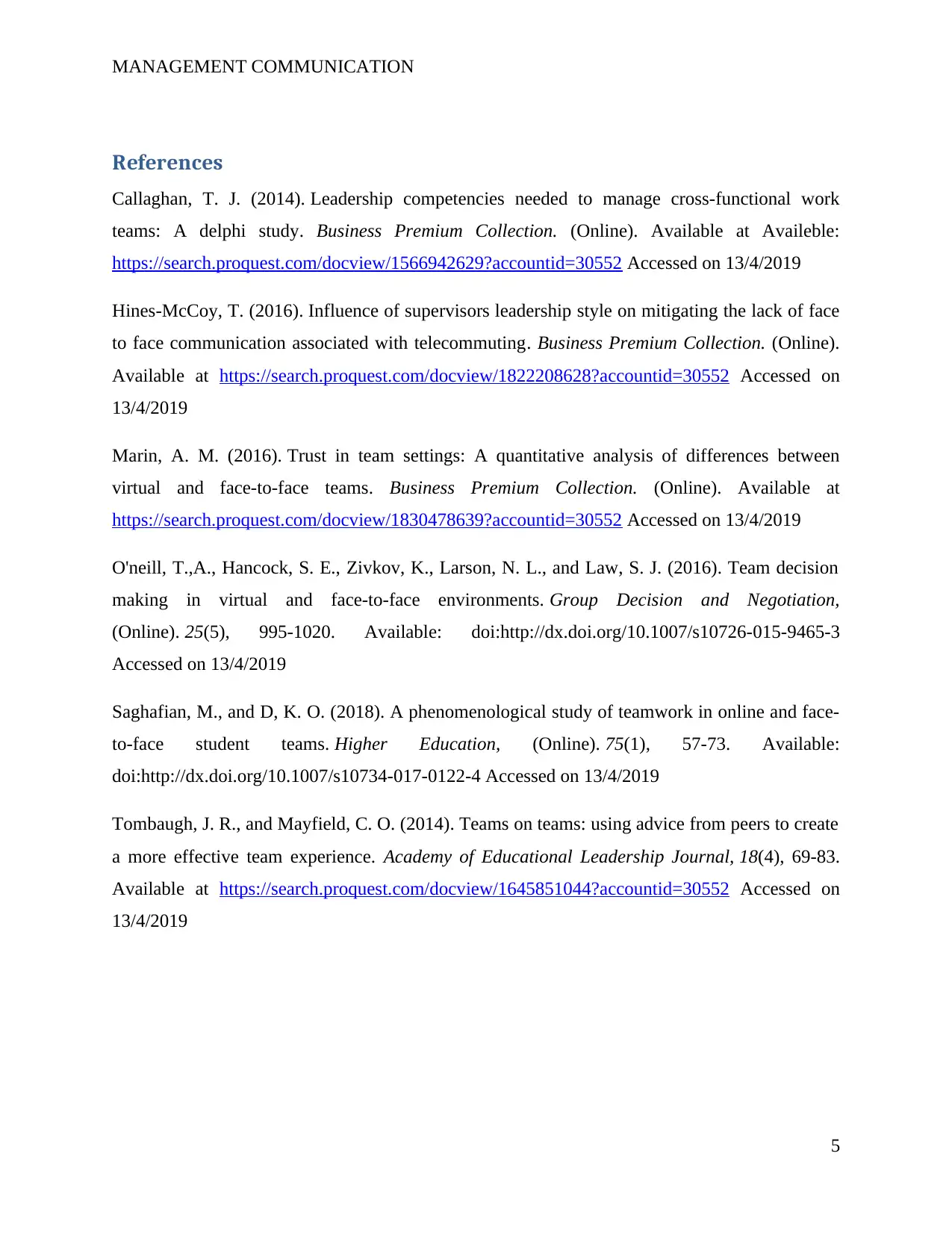
MANAGEMENT COMMUNICATION
References
Callaghan, T. J. (2014). Leadership competencies needed to manage cross-functional work
teams: A delphi study. Business Premium Collection. (Online). Available at Availeble:
https://search.proquest.com/docview/1566942629?accountid=30552 Accessed on 13/4/2019
Hines-McCoy, T. (2016). Influence of supervisors leadership style on mitigating the lack of face
to face communication associated with telecommuting. Business Premium Collection. (Online).
Available at https://search.proquest.com/docview/1822208628?accountid=30552 Accessed on
13/4/2019
Marin, A. M. (2016). Trust in team settings: A quantitative analysis of differences between
virtual and face-to-face teams. Business Premium Collection. (Online). Available at
https://search.proquest.com/docview/1830478639?accountid=30552 Accessed on 13/4/2019
O'neill, T.,A., Hancock, S. E., Zivkov, K., Larson, N. L., and Law, S. J. (2016). Team decision
making in virtual and face-to-face environments. Group Decision and Negotiation,
(Online). 25(5), 995-1020. Available: doi:http://dx.doi.org/10.1007/s10726-015-9465-3
Accessed on 13/4/2019
Saghafian, M., and D, K. O. (2018). A phenomenological study of teamwork in online and face-
to-face student teams. Higher Education, (Online). 75(1), 57-73. Available:
doi:http://dx.doi.org/10.1007/s10734-017-0122-4 Accessed on 13/4/2019
Tombaugh, J. R., and Mayfield, C. O. (2014). Teams on teams: using advice from peers to create
a more effective team experience. Academy of Educational Leadership Journal, 18(4), 69-83.
Available at https://search.proquest.com/docview/1645851044?accountid=30552 Accessed on
13/4/2019
5
References
Callaghan, T. J. (2014). Leadership competencies needed to manage cross-functional work
teams: A delphi study. Business Premium Collection. (Online). Available at Availeble:
https://search.proquest.com/docview/1566942629?accountid=30552 Accessed on 13/4/2019
Hines-McCoy, T. (2016). Influence of supervisors leadership style on mitigating the lack of face
to face communication associated with telecommuting. Business Premium Collection. (Online).
Available at https://search.proquest.com/docview/1822208628?accountid=30552 Accessed on
13/4/2019
Marin, A. M. (2016). Trust in team settings: A quantitative analysis of differences between
virtual and face-to-face teams. Business Premium Collection. (Online). Available at
https://search.proquest.com/docview/1830478639?accountid=30552 Accessed on 13/4/2019
O'neill, T.,A., Hancock, S. E., Zivkov, K., Larson, N. L., and Law, S. J. (2016). Team decision
making in virtual and face-to-face environments. Group Decision and Negotiation,
(Online). 25(5), 995-1020. Available: doi:http://dx.doi.org/10.1007/s10726-015-9465-3
Accessed on 13/4/2019
Saghafian, M., and D, K. O. (2018). A phenomenological study of teamwork in online and face-
to-face student teams. Higher Education, (Online). 75(1), 57-73. Available:
doi:http://dx.doi.org/10.1007/s10734-017-0122-4 Accessed on 13/4/2019
Tombaugh, J. R., and Mayfield, C. O. (2014). Teams on teams: using advice from peers to create
a more effective team experience. Academy of Educational Leadership Journal, 18(4), 69-83.
Available at https://search.proquest.com/docview/1645851044?accountid=30552 Accessed on
13/4/2019
5
⊘ This is a preview!⊘
Do you want full access?
Subscribe today to unlock all pages.

Trusted by 1+ million students worldwide
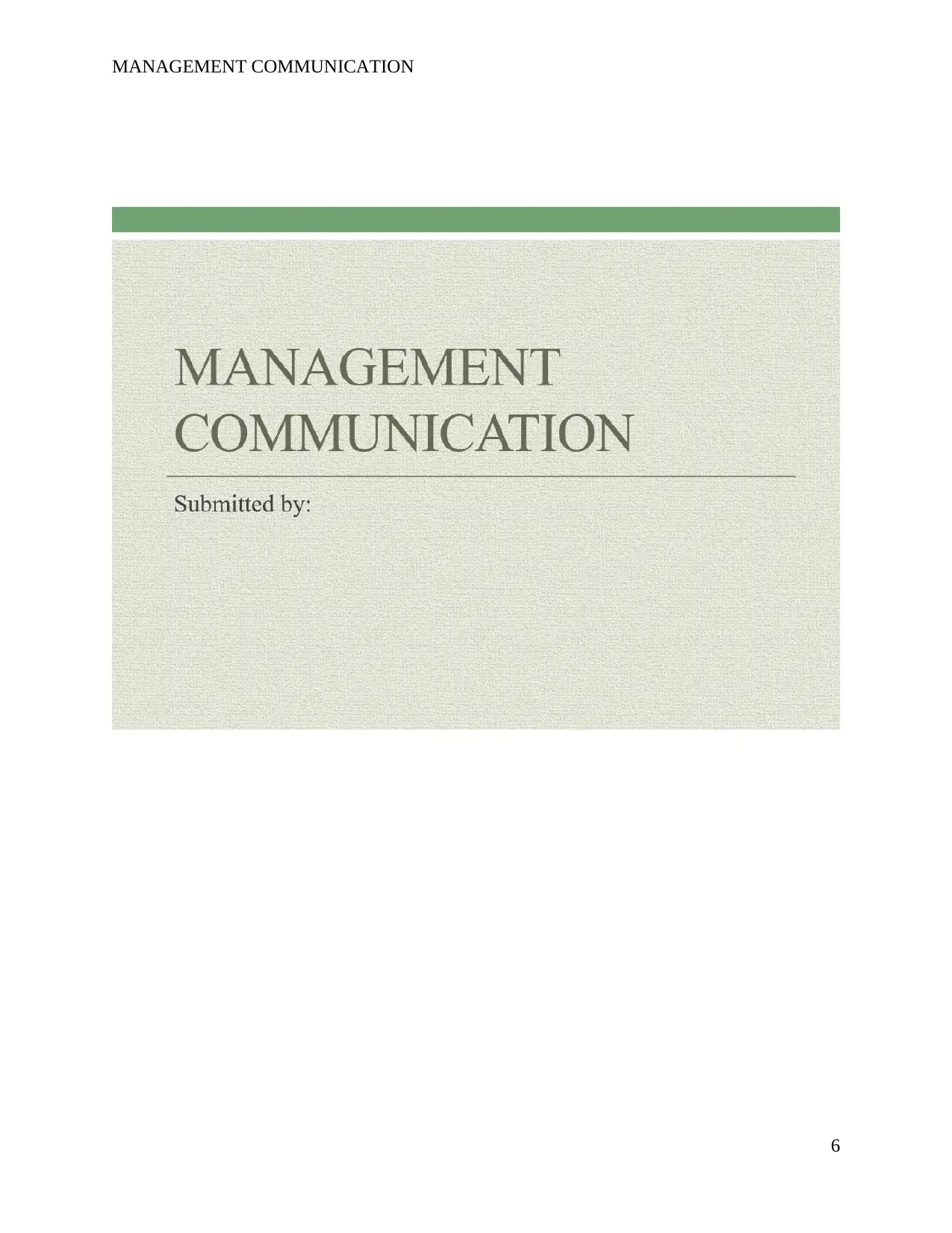
MANAGEMENT COMMUNICATION
6
6
Paraphrase This Document
Need a fresh take? Get an instant paraphrase of this document with our AI Paraphraser
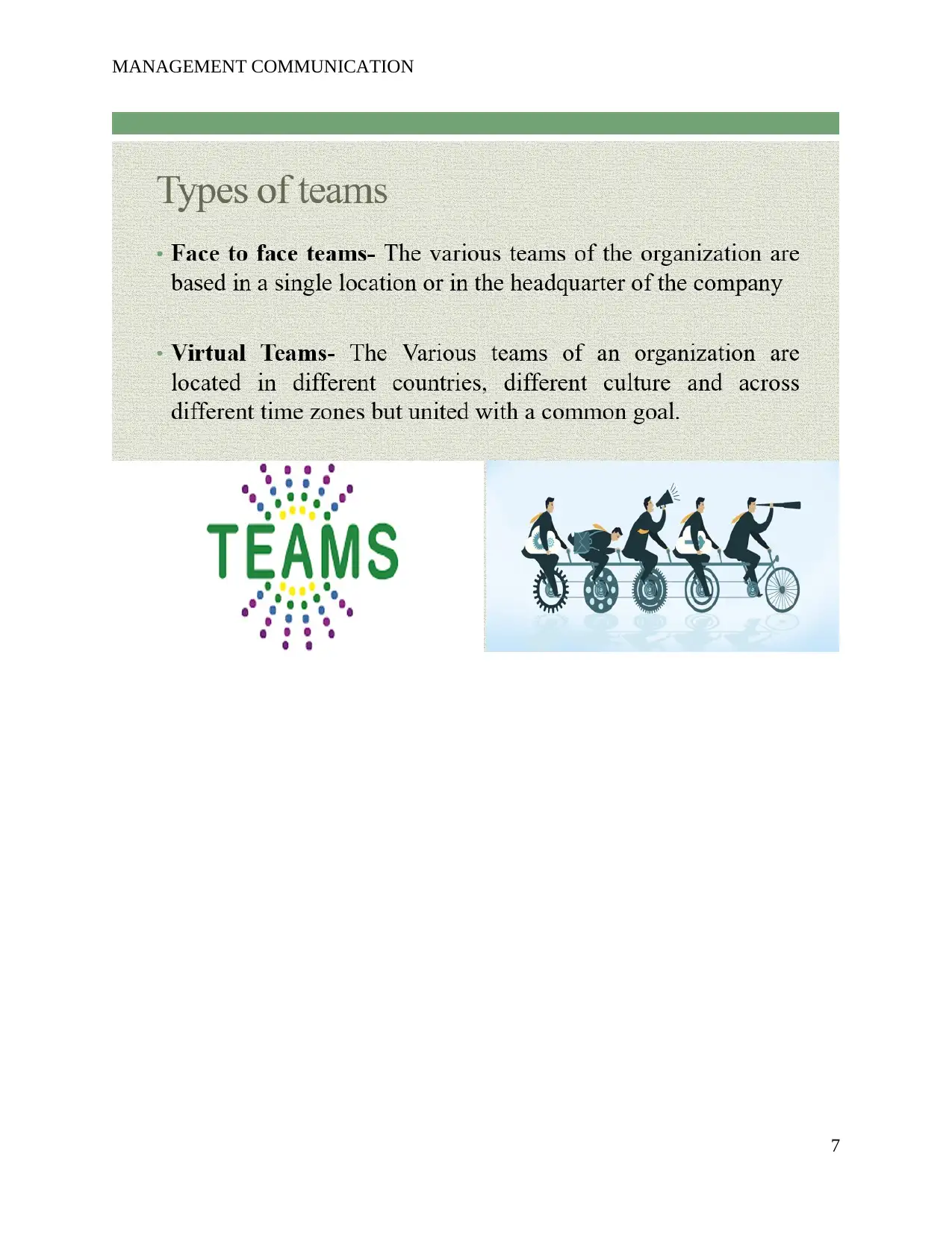
MANAGEMENT COMMUNICATION
7
7
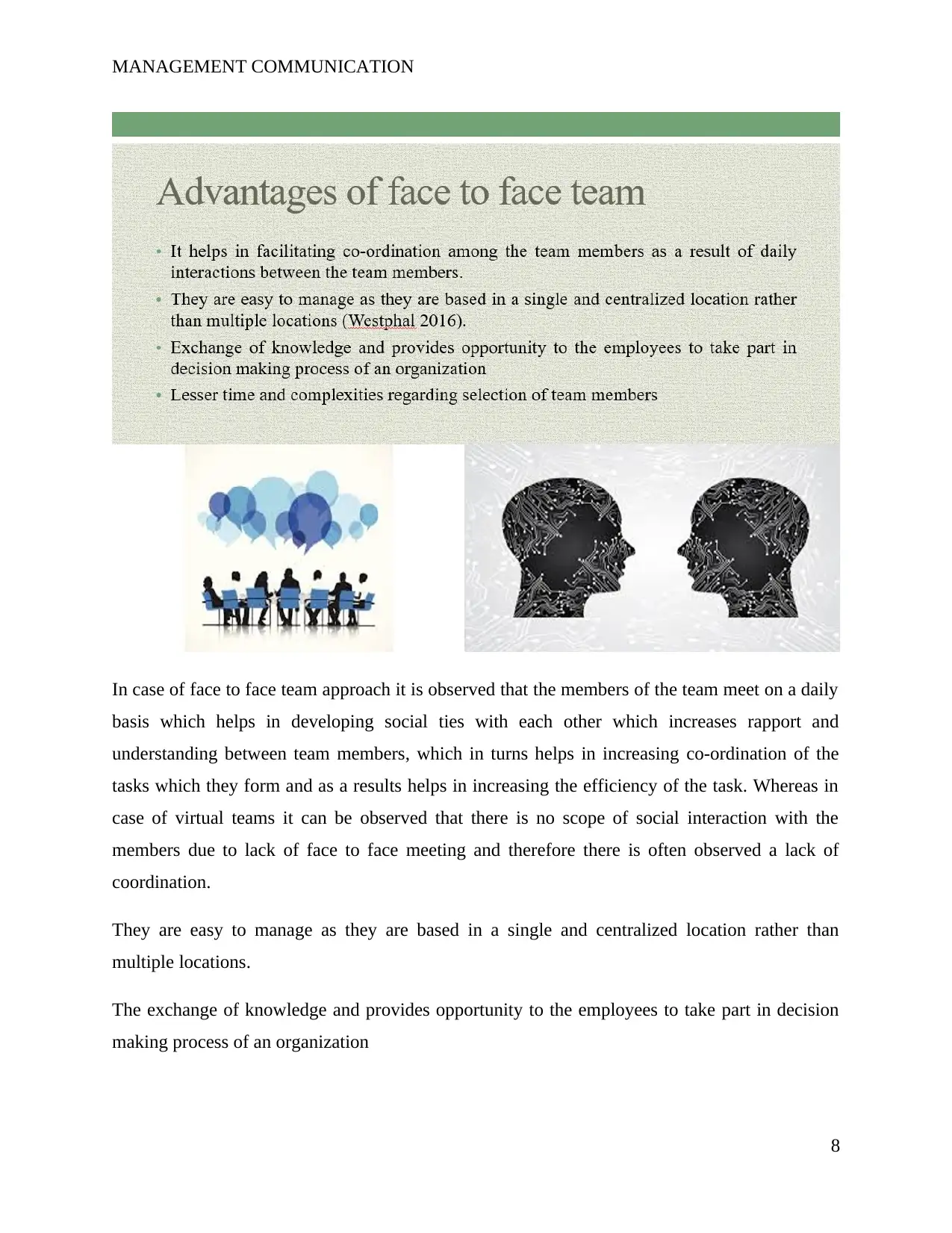
MANAGEMENT COMMUNICATION
In case of face to face team approach it is observed that the members of the team meet on a daily
basis which helps in developing social ties with each other which increases rapport and
understanding between team members, which in turns helps in increasing co-ordination of the
tasks which they form and as a results helps in increasing the efficiency of the task. Whereas in
case of virtual teams it can be observed that there is no scope of social interaction with the
members due to lack of face to face meeting and therefore there is often observed a lack of
coordination.
They are easy to manage as they are based in a single and centralized location rather than
multiple locations.
The exchange of knowledge and provides opportunity to the employees to take part in decision
making process of an organization
8
In case of face to face team approach it is observed that the members of the team meet on a daily
basis which helps in developing social ties with each other which increases rapport and
understanding between team members, which in turns helps in increasing co-ordination of the
tasks which they form and as a results helps in increasing the efficiency of the task. Whereas in
case of virtual teams it can be observed that there is no scope of social interaction with the
members due to lack of face to face meeting and therefore there is often observed a lack of
coordination.
They are easy to manage as they are based in a single and centralized location rather than
multiple locations.
The exchange of knowledge and provides opportunity to the employees to take part in decision
making process of an organization
8
⊘ This is a preview!⊘
Do you want full access?
Subscribe today to unlock all pages.

Trusted by 1+ million students worldwide
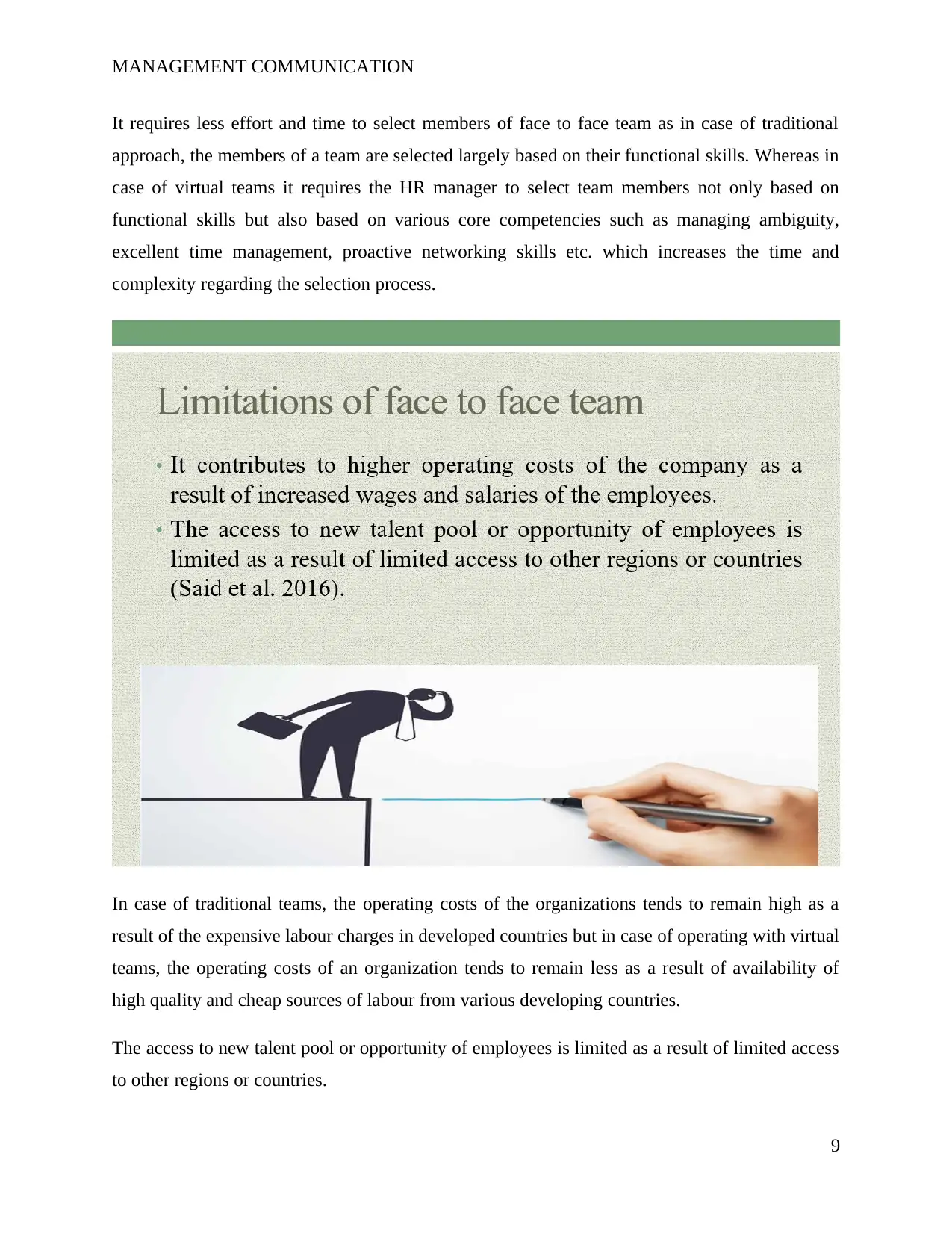
MANAGEMENT COMMUNICATION
It requires less effort and time to select members of face to face team as in case of traditional
approach, the members of a team are selected largely based on their functional skills. Whereas in
case of virtual teams it requires the HR manager to select team members not only based on
functional skills but also based on various core competencies such as managing ambiguity,
excellent time management, proactive networking skills etc. which increases the time and
complexity regarding the selection process.
In case of traditional teams, the operating costs of the organizations tends to remain high as a
result of the expensive labour charges in developed countries but in case of operating with virtual
teams, the operating costs of an organization tends to remain less as a result of availability of
high quality and cheap sources of labour from various developing countries.
The access to new talent pool or opportunity of employees is limited as a result of limited access
to other regions or countries.
9
It requires less effort and time to select members of face to face team as in case of traditional
approach, the members of a team are selected largely based on their functional skills. Whereas in
case of virtual teams it requires the HR manager to select team members not only based on
functional skills but also based on various core competencies such as managing ambiguity,
excellent time management, proactive networking skills etc. which increases the time and
complexity regarding the selection process.
In case of traditional teams, the operating costs of the organizations tends to remain high as a
result of the expensive labour charges in developed countries but in case of operating with virtual
teams, the operating costs of an organization tends to remain less as a result of availability of
high quality and cheap sources of labour from various developing countries.
The access to new talent pool or opportunity of employees is limited as a result of limited access
to other regions or countries.
9
Paraphrase This Document
Need a fresh take? Get an instant paraphrase of this document with our AI Paraphraser
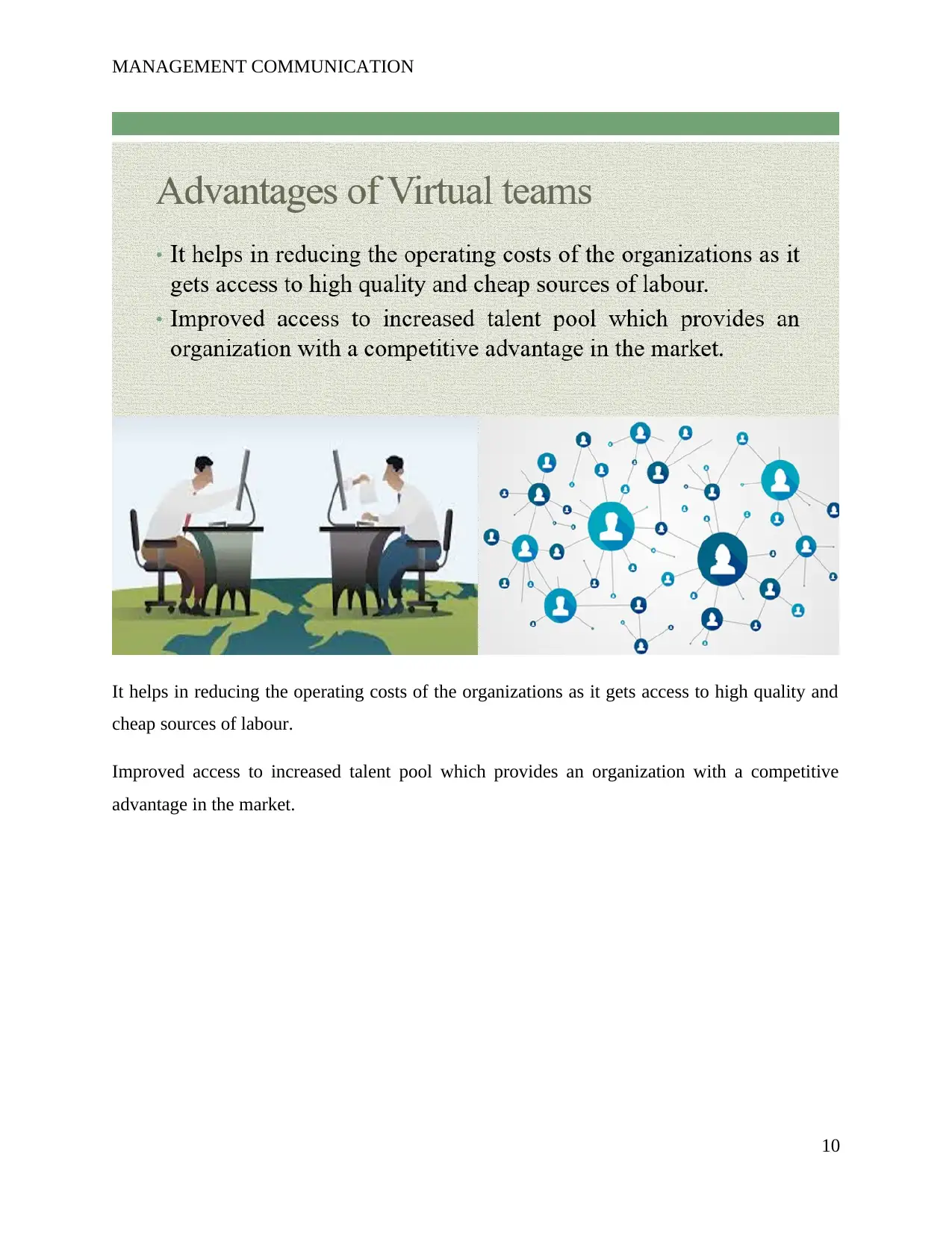
MANAGEMENT COMMUNICATION
It helps in reducing the operating costs of the organizations as it gets access to high quality and
cheap sources of labour.
Improved access to increased talent pool which provides an organization with a competitive
advantage in the market.
10
It helps in reducing the operating costs of the organizations as it gets access to high quality and
cheap sources of labour.
Improved access to increased talent pool which provides an organization with a competitive
advantage in the market.
10
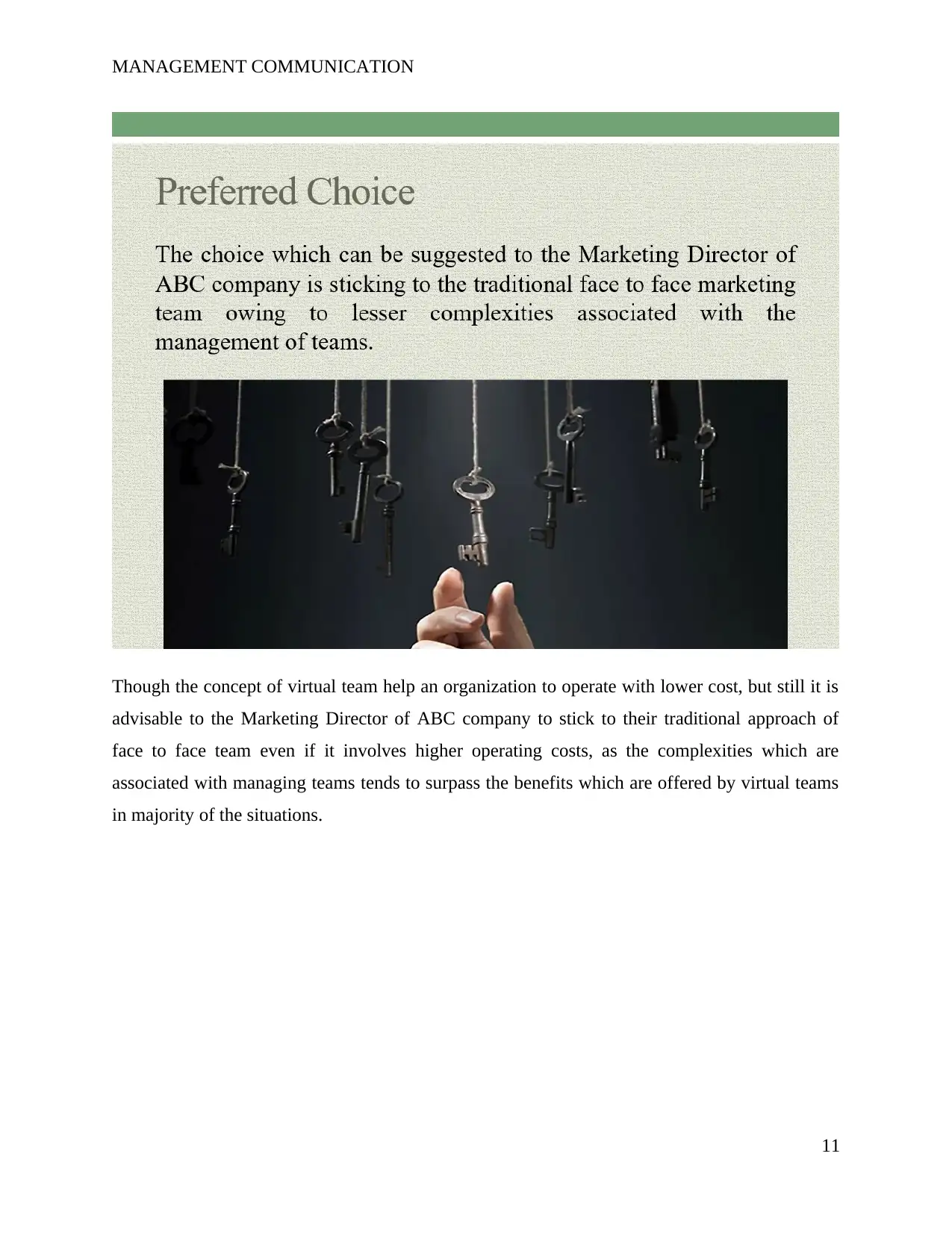
MANAGEMENT COMMUNICATION
Though the concept of virtual team help an organization to operate with lower cost, but still it is
advisable to the Marketing Director of ABC company to stick to their traditional approach of
face to face team even if it involves higher operating costs, as the complexities which are
associated with managing teams tends to surpass the benefits which are offered by virtual teams
in majority of the situations.
11
Though the concept of virtual team help an organization to operate with lower cost, but still it is
advisable to the Marketing Director of ABC company to stick to their traditional approach of
face to face team even if it involves higher operating costs, as the complexities which are
associated with managing teams tends to surpass the benefits which are offered by virtual teams
in majority of the situations.
11
⊘ This is a preview!⊘
Do you want full access?
Subscribe today to unlock all pages.

Trusted by 1+ million students worldwide
1 out of 13
Related Documents
Your All-in-One AI-Powered Toolkit for Academic Success.
+13062052269
info@desklib.com
Available 24*7 on WhatsApp / Email
![[object Object]](/_next/static/media/star-bottom.7253800d.svg)
Unlock your academic potential
Copyright © 2020–2026 A2Z Services. All Rights Reserved. Developed and managed by ZUCOL.




